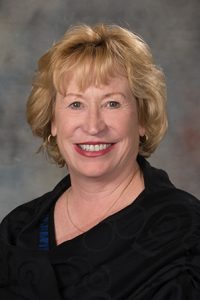Bill would authorize local revenue sources for good life districts
Cities could use local tax revenue to pay for the development of special districts intended to attract out-of-state visitors to new retail, entertainment and dining opportunities under a bill heard Feb. 14 by the Revenue Committee.

The Legislature last session passed the Good Life Transformational Projects Act, which authorizes the state Department of Economic Development to approve applications for “good life districts” that meet certain thresholds related to investment and job creation. Transactions within a district are subject to a reduced state sales tax rate of 2.75 percent.
Sen. Lou Ann Linehan of Elkhorn, sponsor of LB1374, said the bill would allow cities to help a developer finance projects inside a district with local tax revenue, ensuring that “game-changing” projects can move forward.
“The scale, the ambition, the incredible impact of these projects is exactly what we wanted from last year’s bill and is why I introduced [LB]1374,” Linehan said.
Under the bill, a city could — with voter approval — establish an economic development program for an area of the city included in a good life district and appropriate local sources of revenue to pay for certain development costs, including the construction of public and privately owned real estate.
A city could impose a new local option sales and use tax and a business occupation tax within the district to pay for a program. It also could use a portion of the local option sales and use tax cities are allowed to collect under current law.
A city also would be authorized to finance a program by issuing bonds that would be payable from the local sources of revenue.
Additionally, Linehan said, LB1374 would extend the duration of a good life district to 30 years from 25, expand a district’s maximum size from 2,000 to 3,000 acres and allow a district’s boundaries to change over time.
Rodney Yates, owner and operator of Nebraska Crossing in Gretna, testified in support of the bill. Yates, member of an LLC whose application for a good life district in the same area recently was approved by the state, said the district is projected to attract up to 18 million tourists per year, generate more than $2 billion in annual retail sales and create 40,000 jobs.
He said developers and USA Volleyball are close to reaching an agreement to relocate the organization’s olympic athletes, as well as its corporate and training staff, to a proposed $150 million facility in the district. Developers also are in preliminary talks with the NHL to bring a franchise to the area, Yates added.
Also in support was John Cook, head volleyball coach at the University of Nebraska. He said relocating USA Volleyball to Gretna is a “beautiful opportunity” in line with the sport’s ever-increasing popularity in Nebraska.
The proposed volleyball facility also could host youth sports tournaments that would draw visitors from around the region, Cook said.
Testifying in opposition to LB1374 was Mike Rogers, a bond attorney whose firm represents cities with proposed good life districts, including Gretna. He said certain provisions conflict with the U.S. and Nebraska constitutions by proposing to give a private developer sole discretion over which properties are included in a district and therefore subject to different tax rates.
Gretna and other cities would support the bill if those provisions are removed, Rogers said.
Also in opposition was Laura McAloon, Grand Island city administrator. She said the city plans to create a good life district encompassing the state fairgrounds, a downtown business district, a new rail park and a future facility that could make central Nebraska a tourist destination.
“Without the unconstitutional language … we would be 100% behind this bill,” McAloon said. “We want a local option sales tax authority.”
Angie Lauritsen of Gretna also testified in opposition. She said Gretna residents and nearby landowners are concerned about the scale of the proposed development and the city’s associated water, sewer and other infrastructure costs.
The committee took no immediate action on the bill.

